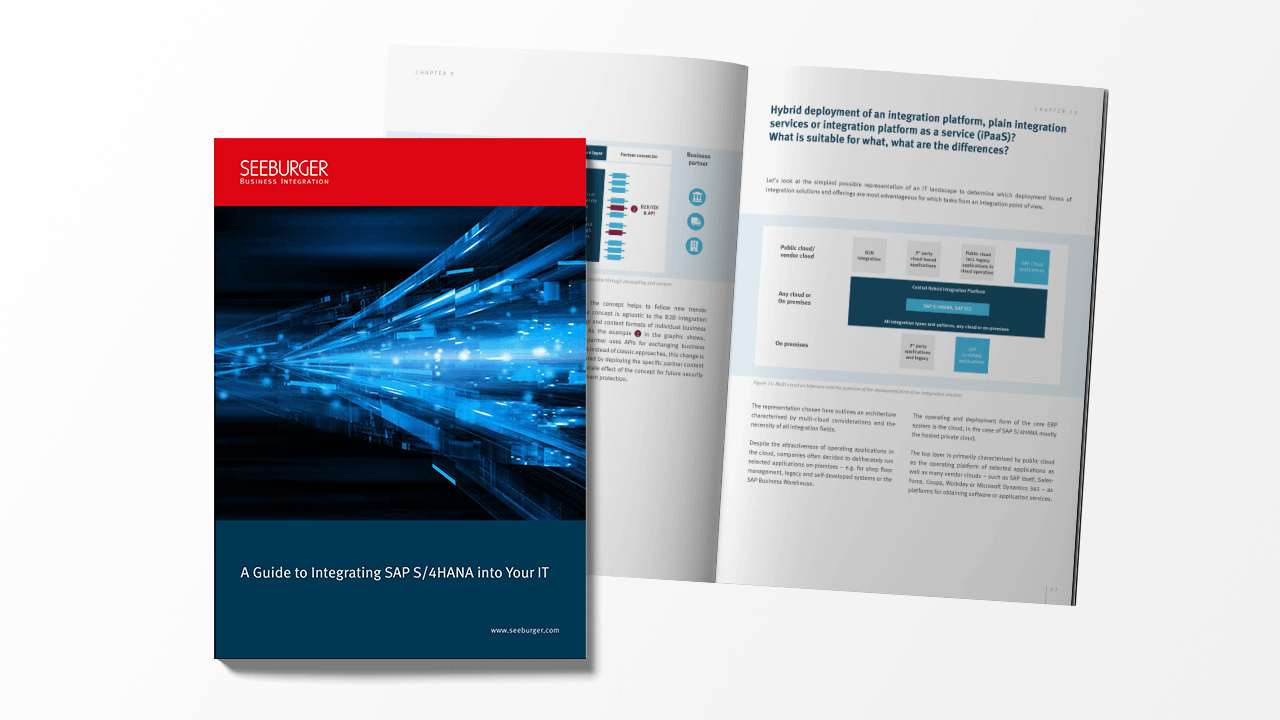
SAP Ariba ERP Integration for Suppliers
SAP Ariba is one of the market-leading procurement platforms for B2B business. Customers and suppliers alike benefit from fully electronic purchasing processes because Ariba enables them to improve their trading partner relationships and create value rapidly.
Suppliers reach numerous customers, associations, and purchasing organizations through the Ariba network at a single point of integration. Through collaborative e-commerce, they can automatically receive orders from their customers and send invoices electronically. International suppliers maintain multiple accounts, one per country, to serve customers worldwide.
Suppliers receive invitations from their customers to use Ariba. With acceptance, they log on to the portal. They can specify through which channels they would like to receive orders and create order confirmations, shipping notifications, invoices, etc. In addition to e-mail, fax, online or direct connection via cXML, the electronic transmission via an integration platform via EDI or web services is also an option to increase efficiency, reduce costs and generate incremental revenues.
Importance of SAP Ariba ERP Integration for Suppliers
Suppliers benefit even more from efficiency and cost savings when they handle increasing volumes via SAP Ariba and digitize associated processes. The best way to do this is to comprehensively integrate all systems involved.
Using middleware such as the SEEBURGER BIS Platform, seamlessly connected to the customers of the Ariba network. This also includes a deep ERP or SAP integration. For the latter, both the classic tRFC connection and connections to S/4 systems are supported via corresponding API interfaces. The SEEBURGER Business Integration Suite contains all integration options that are necessary to integrate into existing IT landscapes. It includes standardized technologies for all types of data exchange, business processes that can be extended at any time, and the option of transferring them to the cloud.
The main advantage is not only the automation of the entire order-to-cash cycle, but also the rapid and transparent handling of all processes. The speed of transactions and the establishment and intensity of business relationships between customers and suppliers are increasing, and suppliers are benefiting from faster cash flows.

Technical challenges of SAP Ariba ERP Integratioi
For integration, systems, processes and trading partners have to be connected simply, quickly and without much effort.
The SEEBURGER BIS ensures this seamless integration of order processing and invoice automation. Preconfigured processes based on standardized Ariba partner mappings are the basis for fast implementation of B2B message exchange, while customer-specific adaptations in the area of data conversion and validation are also supported. In addition, SEEBURGER Business Tracking can be used to generate reports and monitor functions.
A classic EDI connection of these processes is possible, but via web services it is more convenient to communicate in real time. HTTPS requests/responses that request the Ariba Cloud centrally are automatically adapted to changing URLs and the corresponding content is nested and transported.
The following figure shows the processes described between an SAP system and the Ariba Cloud. The various API interfaces are coupled with an integration platform such as the BIS. More demanding requirements for messaging, queuing, or mapping a business process model are supported. The leading system can be an SAP ERP or any other ERP such as Oracle.

Further integration requirements
Catalog data is usually approached as a separate topic.
Static catalog data is often manually uploaded into the Ariba Supplier environment. They contain purchasable items that are usually permanently available. Frequently changing article data can be automatically uploaded to the Ariba portal as a zip file via web services after certain time intervals via the integration platform. For critical or configurable products, a current pullout is possible which provides the latest price/item data or availability. The integration of a multi-backend landscape is necessary in nearly all scenarios. This mainly includes a Production Information Management (PIM), a Customer Relationship Management (CRM) or an inventory management system, as shown in the figure below.
Other marketplaces can then also be connected quickly and easily using the integration platform.
Depending on the supplier, Ariba Supplier Integration consists of a mixture of API-based real-time processes and batch-oriented B2B/EDI processes. This illustrates the need to cover a wide range of integration requirements via a hybrid integration platform and to bundle all interfaces to reduce complexity.

SEEBURGER is an SAP silver partner with extensive SAP expertise.

More Information about SAP Ariba ERP Integration for Suppliers
APIs – from API Management to API Solution
Magento Integration from A to Z
The SEEBURGER API Solution: Integrate Applications and Cloud Services in Real-Time
CPG Companies Increase Flexibility and Profit by Digitally Transforming Their Entire Value Chain
API – What’s really happening behind the buzz?
Will in future API enabled processes replace established EDI/B2B processes?









